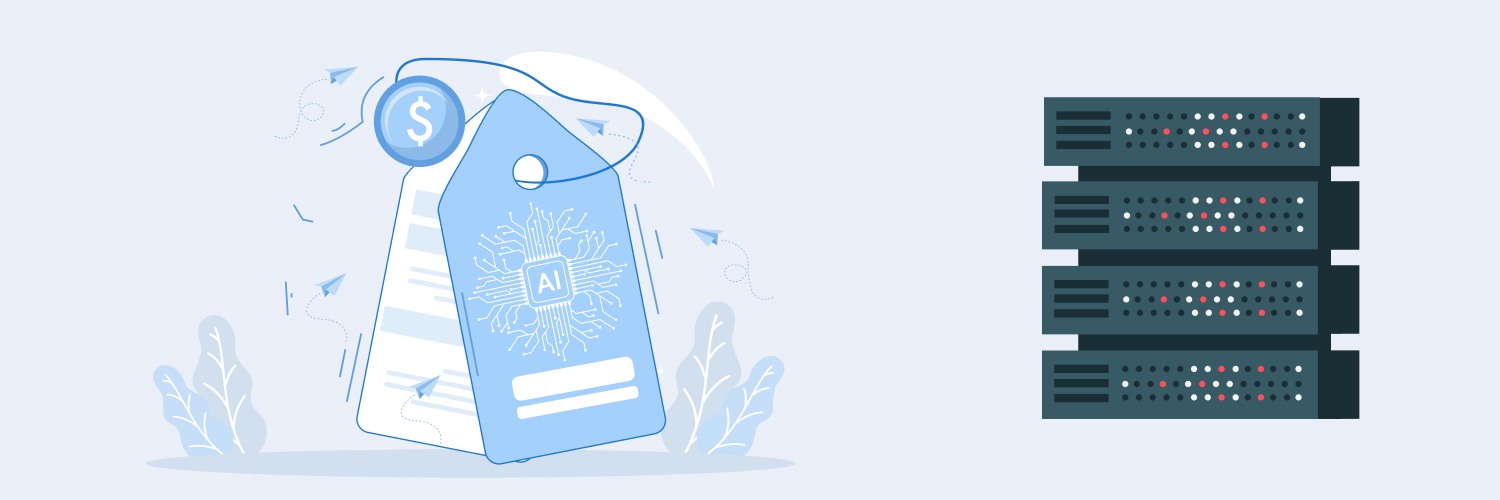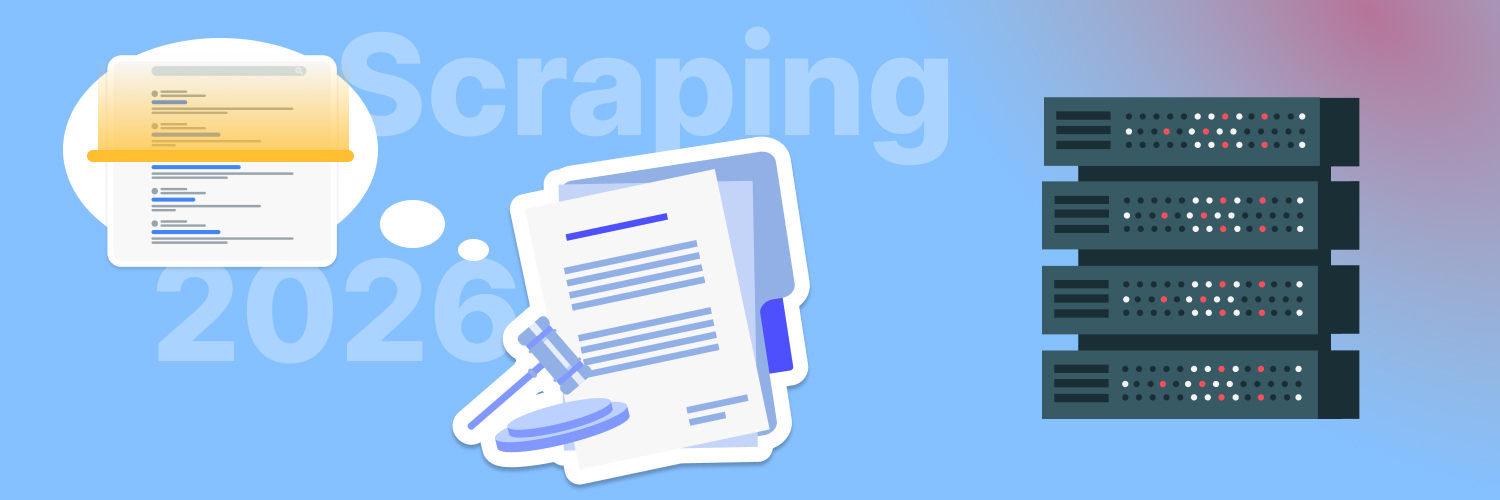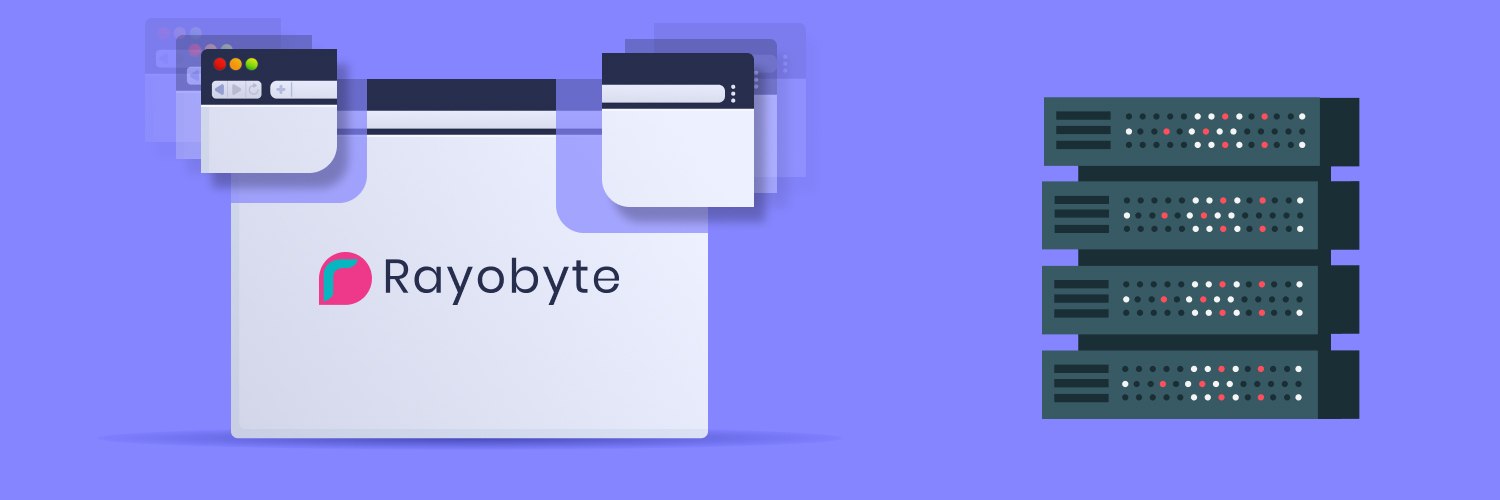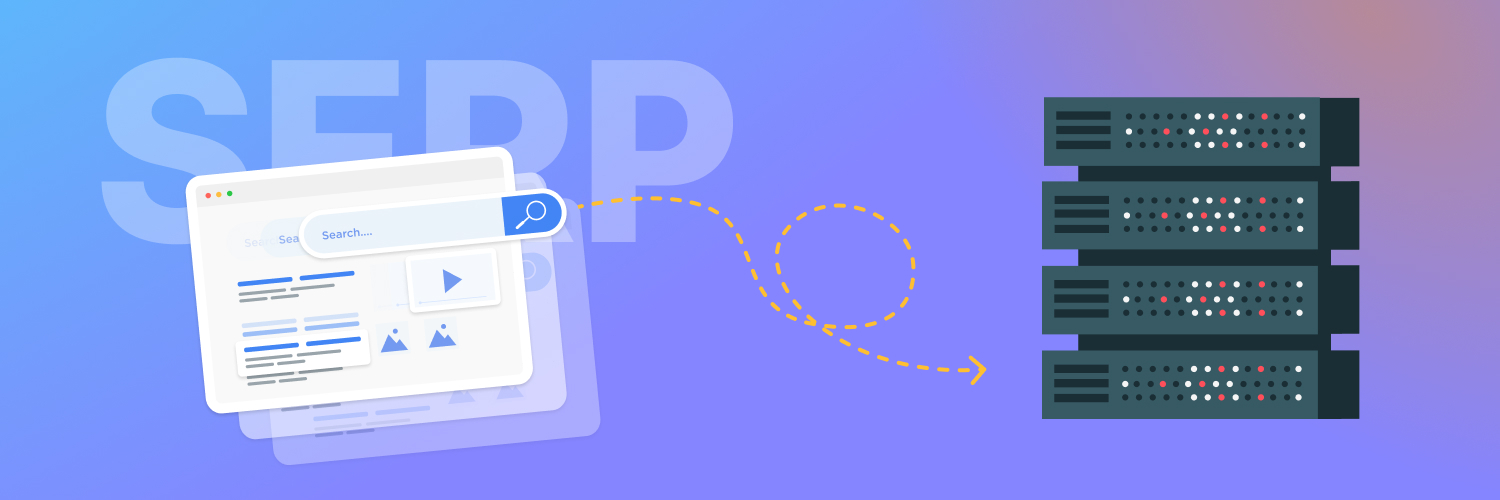Traditional Scraping vs. Proxy APIs – Selecting the Best Method for Your Project
Businesses have to extract a vast amount of online data for various applications, such as training machine learning algorithms. To easily extract the vast volume of data from websites, they need to rely on two methods: traditional web scraping and API.
Both traditional and API web scraping methods are effective ways to extract data from the web. Large sites such as Google allow users to access large amounts of data using proxy APIs. However, other sites don’t allow third parties to access large amounts of data; hence, they only allow traditional web scraping methods.
Fast, Effective, Efficient
Get the API that can meet your web scraping needs.

But as with any other manual process, traditional web scraping has its share of challenges hindering its efficiency. In this article, we compare the two ways to extract data from the web: API vs web scraping, to help you select the best method for your project.
What Is Traditional Web Scraping?

Traditional web scraping method employs manual processes to obtain data from a website. The method involves the use of searching for information from a website and then copying and pasting it into an Excel spreadsheet.
Web scraping also involves using software programs to navigate the desired websites, locate the data, and extract the needed information. This method uses techniques such as HTML parsing, XPath queries, and regular expressions for data extraction. Web scraping follows these steps to successfully extract data from a website.
- Website Identification: The first step is to identify the website from which the data is needed. This can be a specific webpage or an entire website.
- HTML Request: HTML request gives you access to a website to get the information you need.
- HTML Parsing and Data Extraction: The next step is for the web scraper to parse the HTML. This involves extracting data such as texts, images, links, and tables. The web scraper then uses methods such as XPath, CSS selectors, or regular expressions to extract the needed information.
- Data Storage: The final step is the organization and storage of data in Excel, CSV, or a database that is ready to be used for the desired purpose.
Web scraping is a highly effective method of obtaining the needed information from a website. However, this method is only reliable in cases where only small-scale data is required. In addition, the technique still has some challenges that make it hard to extract the site information.
Challenges of Traditional Web Scraping VS API
Website owners have come up with various measures to protect their sites from malicious bots. This means extra security measures are required to limit website access for unauthorized persons. With these security measures in place, web scraping has become quite challenging. Scapers need more knowledge and resources to handle traditional scrips and finish the web scraping process.
Some measures that have made web scraping challenging include:
CAPTCHAs: Bots are not able to handle some tasks, such as identifying images or deciphering blurry text. The behavioral analysis or passive tasks are meant to be easy for humans but difficult for bots. Websites have introduced CAPTCHA solving to identify if it’s a human or a bot trying to write the code. CAPTCHA solving when scraping the web can be slow and needs web scraping expertise to overcome.
Rate Limiting: Another measure that websites have implemented is rate limiting, which slows website traffic. The website employs an IP address to pinpoint the location and IP of its visitors. This allows it to block certain IP addresses from accessing the site or limit the number of requests coming from that particular location.
Browser Fingerprinting involves analyzing user software and hardware and creating a unique ID. Websites can use this to identify and block sites that perform suspicious activities. Web scrapers must adjust and maintain their IDs to avoid being blocked by websites during scraping.
Honeypot Traps: Websites have also developed honeypot traps to improve their protection. These traps are distinguishable links that websites believe only bots will click. When web scrapers click these traps, the website automatically detects that they’re not human and blocks them.
With all these anti-scraping techniques in place, traditional web scraping has become more expensive and challenging. Scrapers have to find another way to maneuver websites and extract the needed information. The solution has come in the form of a proxy service API.
What is API Proxy?

The need for scrapers to pass through protection measures and simplify web scraping has given rise to proxy service APIs. An API Proxy, also known as a Web Scraping API, is an intermediary between a scraping program and the target website.
It uses different proxy types to unblock websites in the backend, something traditional web scraping cannot do. With the unblocking mechanism, the server effectively hides your IP to give you access to any website and restricted information. It effectively avoids anti-scraping techniques to provide the bots with the needed resilience in accessing websites.
With a Proxy API, no amount of website protection can hinder it from penetrating and extracting information. If it encounters roadblocks such as CAPTCHAS, the proxy API adjusts it’s configurations and retries the access until it succeeds.
How Does Proxy API Web Scraping Work?
Proxy API web scraping is the combination of a proxy server and an API (Application Programming Interface) to scrape the web. Proxy API works by:
- Initiating Request: The first step starts with sending a request to the API server with the specific data and action. The request includes the target website URL and data extraction information.
- API Routing: The API routes through proxies as an intermediary to send the request through proxy servers. The servers work with different IP addresses spread across locations.
- IP Masking and Browser Simulation: The server masks your IP to avoid being blocked. The API service also emulates browser behavior by sending headers and cooking so that appears legitimate to avoid blocking.
- Data Extraction: The proxy extracts the needed data and information from its target website based on the instructions fed to the servers. The process involves HTML parsing. The extracted data is then delivered to the program for storage and use for the intended purpose.
How Proxy Service API Handles Web Scraping Challenges

The API simplifies web scraping by providing a managed solution for overcoming common challenges. It helps you scrape data more efficiently and reliably while also reducing the risk of getting blocked by websites. Some techniques that proxy IPI employs to unblock websites effectively include:
1. IP Masking and Rotation
To successfully scrape a website, you need to avoid IP blocking. The API proxy ensures users bypass IP blockage by providing a pool of proxy servers containing different IP addresses. The requests will be routed through the proxies to hide your IP address so the target website doesn’t identify it. The API also works by automatically rotating the IP addresses making it hard for websites to detect and block.
2. Enhanced Browser Simulation
Some websites employ anti-bot measures that identify browser behavior and block suspicious access. With API proxy, you can simulate browser behavior, such as sending headers and cookies. With the simulation, your scraper will appear legitimate and reduce the chances of being detected and flagged as a bot.
3. CAPTCHA Solving
CAPTCHAs continue to make it hard for web scrapers to access information. API proxies come with a CAPTCHA-solving mechanism to bypass the challenges and ensure scraping success.
4. Honeypot Detection
With proxy API, you can easily detect and avoid honeypot traps. These links are put in place to detect and block automatic web scraping attempts.
5. Fingerprint Poofing
With proxy API, you can easily evade fingerprint detection and blockage. They randomize fingerprints by selecting the right headers, passive fingerprints, and relevant data.
6. JavaScript Rendering
Websites often rely on JavaScript to generate content, which may be challenging with traditional web scraping techniques. An API proxy uses its own server to handle JavaScript rendering and then delivers a complete HTML to the program. If you encounter websites relying heavily on JavaScript, proxy API can help you retrieve the information.
7. Scalability and Management
It’s complex and challenging to manage a large pool of proxies. With API proxy service, you have a pool that is readily available. The server also takes care of any maintenance tasks needed for these proxies. You can only focus on scaling your scraping work and let the servers manage the infrastructure.
The Advantages of Using Proxy Server for Web Scraping

Using Proxy API for web scraping is increasingly becoming popular thanks to the several advantages it offers.
Improved Efficiency
API proxy boasts an up to 90% success rate in scraping the website. Thanks to their understanding of web semantics and content, they accurately and efficiently extract data from the web and eliminate the need for manual information access.
Adaptability and Robustness
API proxy is highly adaptable and robust. It can handle any situation when trying to access a website. It adapts to new technologies and features brought about to help increase website bot blocking mechanisms. High adaptability and robustness make the servers more resilient without frequent updates and maintenance.
Geolocation Targeting
Some websites deliver different content to their visitors based on location. This limits people from accessing certain information that may be useful for their business. Proxies allow users to specify their desired location so that they can get location-specific data that is valuable for market research and competitiveness.
Increased Scalability
Proxy servers are efficient for large-scale web scraping projects because of their scalability. You can scale your operations easily without worrying about managing different proxies. Their ability to evenly distribute scraping requests also makes them efficient for multiple servers.
Respecting Robots.txt
While Proxy API has the ability to bypass any bot blocking mechanisms, they still respect robots.txts. Websites use robots.txt to communicate to web crawlers to avoid certain parts of the site. Proxies distribute scraping requests to various IPs and reduce the load on single servers. This enables them to scrape a site without being highly noticeable or causing website overload.
Automation and Cost Saving
Web scraping can be expensive and time-consuming. Proxy APIs make the work easier by automating the tasks that appear challenging. Automation makes scraping easier and quicker, saving money in the long run.
Web Scraping vs API: Which Should You Choose

Both proxy API and web scraping are techniques used to extract information from the web. Choosing between the two depends on what you want to achieve and other factors such as cost. Some of the deciding factors for choosing API vs scraping include:
Control and Freedom
Web scraping offers more control and freedom to extract any publicly available information from the web. You have complete control over the extraction process and can decide what information to retrieve and in what format.
The proxy API gives you limited control over the scraping process. Its functionalities will limit your level of customization.
Anti-Blockage Techniques
While web scraping gives you complete freedom and control of the process, it comes with the risk of IP blockage. Many websites don’t approve of scraping and will block any scrapers attempting to access their sites.
Proxy API employs automatic IP rotation and browser simulation, which helps it bypass any blockage mechanisms that websites have in place. They can solve CAPTCHAs and identify honeypot links that standard bots won’t detect.
Efficiency and Scalability
If you’re looking for high efficiency and scalability, proxy API will be the best choice. They distribute scraping requests across servers, making them suitable for large projects. The readily available proxy pools make it easy to scale and handle different kinds of projects.
Traditional web scraping experiences efficiency and scaling issues. Difficult in management and the risk of overloaded servers make it challenging to achieve scalability.
Cost
Traditional web scraping techniques are cost-effective because the tools used are publicly available. Web scraping is affordable as long as you understand the programming language and have the technical expertise.
Using Proxy API requires subscription fees, which not everyone can afford. The subscription fees also vary with usage limits and features. The more you pay, the more advanced features you get and the more usage you can do.
This table summarizes the key differences between proxy API vs web scraping.
| Traditional Web Scraping | Proxy API |
| Easy control and customization | In-built functionalities limiting control |
| Cost-effective | Subscription fees apply |
| Technical expertise (programming language) | No technical expertise needed |
| Not suitable for large-scale scraping projects | Highly scalable for large database |
| Exposed to IP blocking risk | Can bypass any blockage |
| Difficulting creating and maintaining scrapers | Easy maintenance |
The choice between scraping and API depends on the resources, expertise, and needs. If you understand the programming language and want complete control, traditional web scraping will work for you. Proxy service API will work for you if you prefer a highly scalable, effective, and minimized blockage risk.
Choosing the Best API Web Scraping

There are several things to consider when choosing the best web scraping API. The features should depend on specific project needs and what you intend to achieve. Some of the things to consider include:
1. Target Websites and Complexity
Your API should handle a variety of websites with different structures. It should also have good parsing capabilities and be able to handle JavaScript.
In addition, ensure your API can provide powerful extraction features and support customization. You need a robust Proxy API that can handle the complex structures.
2. Features and Functionality
Your proxy API should be able to employ various extraction methods, such as JSON extraction and HTML parsing. It should have complex browser capabilities to handle complex websites.
Automatic IP rotation capabilities are also crucial for your Proxy API to bypass any scraping blockage mechanisms. You cannot overlook a large pool of quality proxies with a geo-targeting option.
Another important feature is handling CAPTCHAs. Your API should have a solution that allows users to bypass the CAPTCHAs and easily access the target website.
3. Scalability and Ease of Use
If you’re using a proxy API for the first time, you need one with a user-friendly interface. Your API should offer scalability to handle a large scraping project. Ensure your API can handle high traffic and has features capable of dealing with distributed scraping.
4. Cost and Pricing
The cost of your API should also be an important factor. They come with tiered subscription plans priced according to usage limit, features, and bandwidth. You can also consider one that features a free trial so you can try their service before spending money. Don’t forget to watch for additional costs, especially if you exceed your usage or bandwidth limit.
What Is Web Scraping Used For?

Now that we understand all about web scraping and compared api vs scraping, it’s important that we understand the purpose. So, what is web scraping used for?
Business Automation
Extracting large amounts of data from the web manually can be time-consuming and expensive. You need something to help you do it fast and efficiently. Web scraping processes can automate the data extraction process, saving you time and money.
Market Research
With scraping, businesses have the freedom to gather information and data on products, customer reviews, and market pricing. With this information, they can develop effective pricing strategies, understand market trends, and identify opportunities.
Social Media Monitoring
Social media is an integral part of marketing. Businesses need to scrape social media data to understand how their products are performing in the market and develop effective campaigns. Web scraping is a valuable tool for the collection and analysis of social media conversations concerning a specific brand.
Real Estate Data Collection
The real estate industry relies on scraping to get information such as property listings, market trends, and pricing from different real estate websites. With the information, they can generate leads and identify investment opportunities.
Lead Generation
Information such as listings, industry directories, and social media trends are important for coming up with effective marketing strategies and generating sales leads. Businesses can also rely on web scraping for scientific research, news aggregation, and industry directories.
Fast, Effective, Efficient
Get the API that can meet your web scraping needs.

Web Content Monitoring
Businesses need to stay up to date with industry trends. They need to identify investment and marketing opportunities. To do this, they need to scrape different websites to gather information on products, pricing, and competitor activities. They can also scrape the web to monitor websites for keywords and topics of interest.
Key Considerations When Using Proxy Server for Web Scraping

Even when dealing with websites that permit web scraping, you should still do it responsibly and ethically. Some key considerations to put in mind include:
- Respect robots.txt: A robots.txt file tells scrapers which part of the website they should not touch. Whether using traditional scraping methods or proxy API, these guidelines must be respected.
- Avoid overloading servers: When scraping, don’t overload website servers with too many requests. Limit your server requests to avoid overloading the websites, which can lead to IP blockage.
- Consider copyright and privacy: Ethical and legal considerations should be at the forefront of any scraping request. You must also consider copyright and privacy laws when scraping to avoid getting in trouble with the website owners.
Conclusion

Web scraping remains a powerful tool for scraping data online. Both traditional web scraping and proxy API aim to achieve one goal: gathering information from the web for various business purposes. They both have benefits and drawbacks that make them suitable for specific needs.
To choose the best between web scraping vs API, you have to consider things like scalability, efficiency, and cost. If you have the technical expertise and understanding of programming languages, you can consider going for traditional web scraping. If scalability and large-scale scraping are your goals, proxy API web scraping will work well for you.
If you believe web scraping with proxy API can help your business grow and achieve its goals, Rayobyte is ready to give you access to residential and data center proxies. Sign up today and get started with reliable proxies.
The information contained within this article, including information posted by official staff, guest-submitted material, message board postings, or other third-party material is presented solely for the purposes of education and furtherance of the knowledge of the reader. All trademarks used in this publication are hereby acknowledged as the property of their respective owners.



